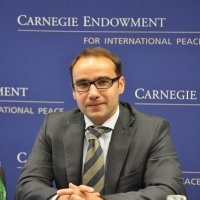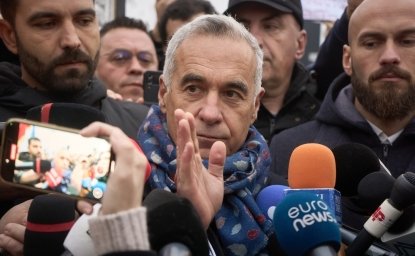
A blog of the Kennan Institute
BY LYNDON ALLIN AND BALAZS JARABIK
The Moldovan opposition's ouster of the ruling Democratic Party of Moldova (PD) represents a big battle won in the war against kleptocracy. With diligent follow-up and support, it could also lead to the emergence of a political culture that prizes good governance over false geopolitical choices.
Vladimir Plahotniuc became Moldova's key political decision-maker without holding a high office or enjoying widespread popular support, but through corruption, kompromat, and an adroit use of geopolitical rhetoric. He was finally ejected from his position and abruptly left the country after an unprecedented ruling coalition of President Igor Dodon's Socialists and the ACUM bloc came together at the 11th hour before a deadline for forming a government following the February 24 parliamentary elections and was backed by Russia, the EU, and the United States.
Today there is a palpable sense of hope in Chişinău that the worst elements of the old regime—systematically corrupt prosecutors and judges—will fade from the scene as their paymaster Plahotniuc has left Moldova for parts unknown. Yet that sense of hope has its counterpart in skepticism, as previous political turning points failed to produce enlightened governance.
If much time passes without decisive steps being made toward retaking the state captured by the PD and initiating genuine efforts to recover stolen assets, then the fragile optimism could easily be squelched, especially because the media controlled by Mr. Plahotniuc still dominate the country's information space.
The new government will have to tread carefully and avoid getting mired in debates over fraught identity and geopolitical issues, which will not ultimately solve the problems of greatest concern to Moldovan citizens: poverty and corruption.
Geopolitical competition played an unfortunate if indirect role in the emergence of the captured system of government under which the PD exercised control to an extent utterly out of proportion with its level of public support. The apparent indifference of Moldova's Western "development partners" to the situation and reluctance to send strong public signals continued even as evidence of abuse of the justice system mounted.
The new and unique cross-geopolitical coalition between Dodon's party, which has oriented itself toward Russia, and ACUM, which identifies itself as pro-Western, is a sign of Mr. Plahotniuc having gone too far, but also may represent a more sober approach, one that minimizes geopolitics, in light of their role in the bloody crisis in Ukraine and their irrelevance to addressing the bread-and-butter issues of greatest interest to Moldovan voters. Having been part of the problem, Moldova's international partners should continue to be part of the solution. They could have a critical role to play in restoring the rule of law.
Sanction the Bad Guys
The first and lowest-cost step in this direction is to clearly signal that the U.S. government will initiate an interagency process sanctioning Mr. Plahotniuc under the U.S. Global Magnitsky Act (GMA), which provides that the United States may sanction foreign government officials or their associates who are responsible for, or complicit in, ordering, controlling, or otherwise directing acts of significant corruption.
Sanctioning Mr. Plahotniuc is important for several reasons. It would send a powerful signal to the remnants of his party remaining in the country that their leader will not be returning to protect and pay them. Shaking the faith of his inner circle in the “godfather” would also likely encourage whistleblowers and cooperating witnesses to come forward. These will be necessary if the multiple massive bank fraud schemes perpetrated on Mr. Plahotniuc’s watch, including the theft of U.S. $1 billion from several Moldovan banks and the "Laundromat" money laundering scheme, which allegedly processed as much as U.S. $70 billion, are to be resolved.
Sanctioning Mr. Plahotniuc under the GMA would also be a powerful demonstration of what should be expected by those elements in the new ruling coalition who may consider emulating a Plahotniuc style of governance. Knowing that Mr. Plahotniuc has become an international untouchable will deter behind-the-scenes deal-making by other associates, who might otherwise succeed in using their ill-gotten riches to buy indulgences from the new authorities. Finally, sanctions would reduce Mr. Plahotniuc's ability to project influence back into Moldova, as well as to Washington and other capitals, where the PD has had considerable lobbying budgets in recent years.
The United States should take the lead on this issue. Washington has a sanctions program in the GMA that is expressly designed for kleptocrats such as Mr. Plahotniuc. It is in the United States’ national interest to be seen as a leader in this area.
It is unlikely that Russia or the EU will do much in the matter of sanctions. Russia has already opened a criminal case against Plahotniuc, while the EU may not be able to reach a consensus. Romania, for example, seemed reluctant to take swift action during Moldova’s recent constitutional crisis.
Finally, it is important to remind other regional leaders and those more distant that being in Washington's good graces as a situational partner does not give them carte blanche to abuse state institutions at home. Starting under the Obama administration, the United States allowed itself to become co-branded with Mr. Plahotniuc's regime. This co-branding was of greatest value to Mr. Plahotniuc for his own legitimization in domestic political struggles, but it seems he faced few challenges in convincing the Washington policy community to accept him as someone who would use a strong hand to hold the line against Russian influence in Moldova. Somewhat ironically in light of his self-styled image in the West as a bulwark against Russian influence, one of his last-ditch efforts to retain control of Moldova appears to have been a proposed deal with Moscow.
Transition to Justice
Moldova's key challenge now is in reforming its captured institutions, in particular the justice system. For once, Mr. Plahotniuc's excesses have created a remarkable moment of consensus among political rivals. They appear to be ready to act in concert.
There seems to be a consensus, for example, on the need to take orderly, transparent measures to remove the most corrupt individuals from the prosecutor general's office and the judiciary. But there is concern that such changes will take place not on the basis of individuals' competence or integrity but (as they have in the past) as a matter of political score-settling and nepotism. The past week has brought a growing avalanche of public accusations against members of the PD organization which risks turning into trial by TV talk show unless some order can be brought to the process.
Foreign stakeholders' leverage can be used to emphasize that a cleansing process must happen—and that it must be done without any undue influence. Building on the process that was started by the establishment of the parliamentary committees last week—one on the billion-dollar bank theft, one on the PD's efforts to cling to power, and a third on privatization—is important to quarantine the deputies in the new coalition from potential influence from Mr. Plahotniuc’s deputies and those effectively controlled by him including the group of deputies headed by Ilan Shor, who played a key role in the billion-dollar bank fraud (Shor is another suitable candidate for designation under GMA).
Impartiality, objectivity, and accountability will be vital. The process should use objective criteria to decide which public servants should be sanctioned and which can continue to perform their duties. This process should begin as soon as practicable; otherwise momentum will be lost and the window of opportunity to change people's expectations of their government will close.
However, the parliamentary committees - currently the only investigative instruments not penetrated by holdovers from the previous regime – may be challenged by limited staff capacity to discharge their duties at a level befitting the gravity of the issues. The West can and should offer rapid support from experts in transitional justice.
Follow the Money
Without resolute action to track down, freeze, and return to the Moldovan people the stupendous amounts plundered by Mr. Plahotniuc and his associates, they may live to fight another day. The immediate impression is that the PD plans to go into opposition status, which may allow it to pursue the same dirty tricks and disinformation tactics that were the party’s hallmark during its time in power.
This makes it all the more important not only to seek to freeze the party’s assets by sanctioning key individuals but also to try to recover whatever portion of those assets can be found.
The pursuit and recovery of assets is especially important as some in power now may be tempted to follow the “same old” governance pattern. A return to the rhetoric of geopolitics in place of domestic policy would again hobble Moldova's ability to achieve objectives of key importance to its people, namely, overhauling the justice system so that it provides justice instead of catering to vested interests and improving the economy, as the new government announced.
Self-proclaimed "pro-Western" political partners such as Mr. Plahotniuc have left the Western brand severely tarnished in Moldova and have achieved an effect opposite to advancing the West's – or Moldova's – interests. Kleptocrats like Mr. Plahotniuc are not actually "loyal" to the United States or any other partner.
Russia's new-found pragmatism, even if that stance is tactical and based on an assumption that Prime Minister Maia Sandu’s government will fail to fulfill its enormous agenda, should be welcome. After Moscow’s deliberate moves against Mr. Plahotniuc, it would now be in everyone`s best interest if Moscow quietly backed the steps outlined above to ensure a smooth transition from Moldova's captured-state era to a more stable government which would continue to pursue the European integration agenda apparently accepted by Russian emissary Dmitry Kozak, who observed during a recent visit to Chisinau that Russia "does not deny the European choice of the Moldovan people."
In the West, it is high time to realize that “pro-European” Moldova, which started with the ominous Twitter revolution in 2009, fell victim to its own inability to fight corruption and modernize state institutions. Putting Moldovans' wish to live in a better country first would actually be the best geopolitics.
Authors



Kennan Institute
The Kennan Institute is the premier US center for advanced research on Eurasia and the oldest and largest regional program at the Woodrow Wilson International Center for Scholars. The Kennan Institute is committed to improving American understanding of Russia, Ukraine, Central Asia, the South Caucasus, and the surrounding region though research and exchange. Read more

Explore More in The Russia File
Browse The Russia File
In Search of Russia’s Digital Trace in Romania’s Political Crisis

With Syria’s Collapse Russia’s Regional Power Play Disintegrates

Putin's Strategy Tests Europe's Defense Limits

